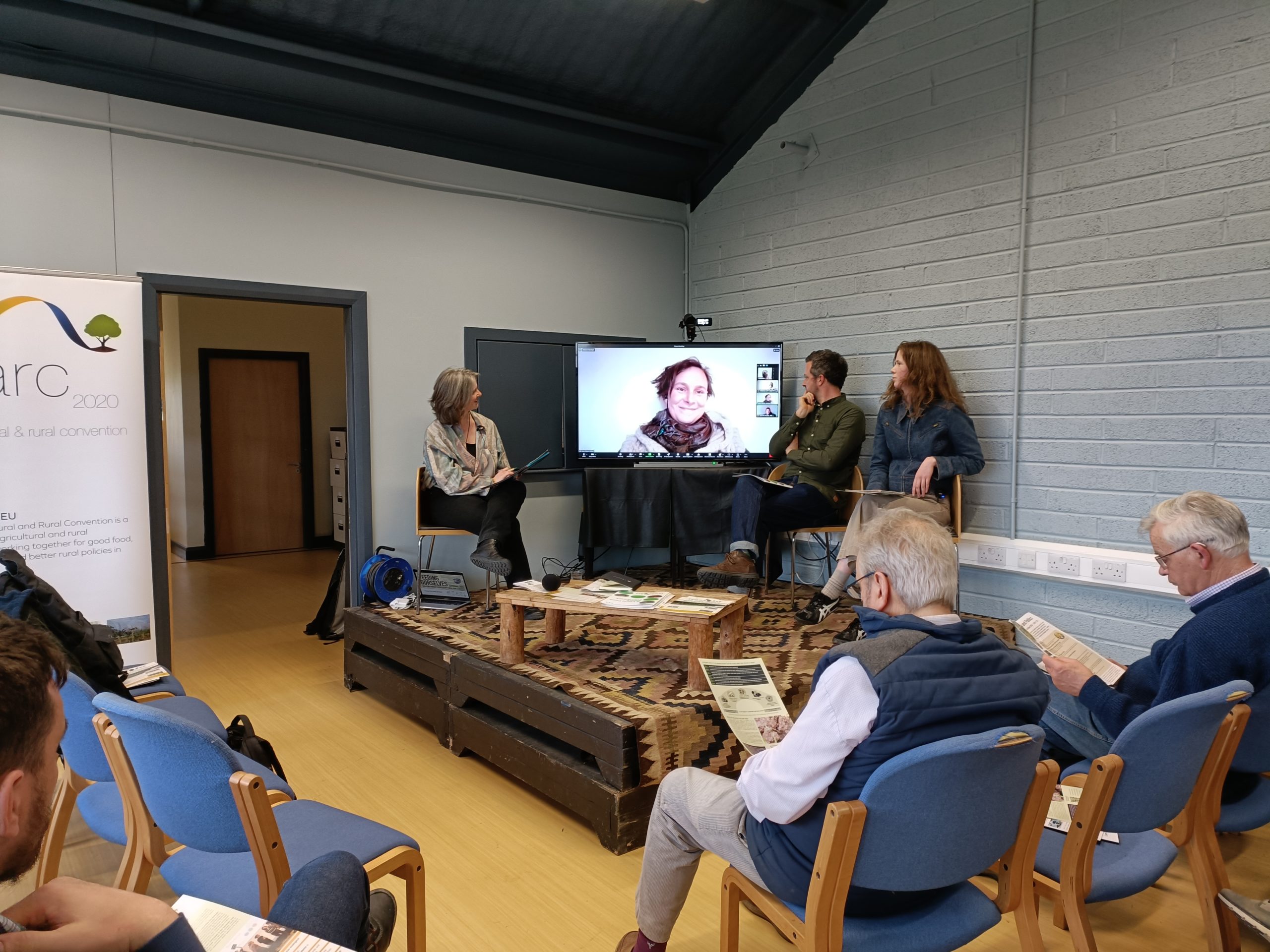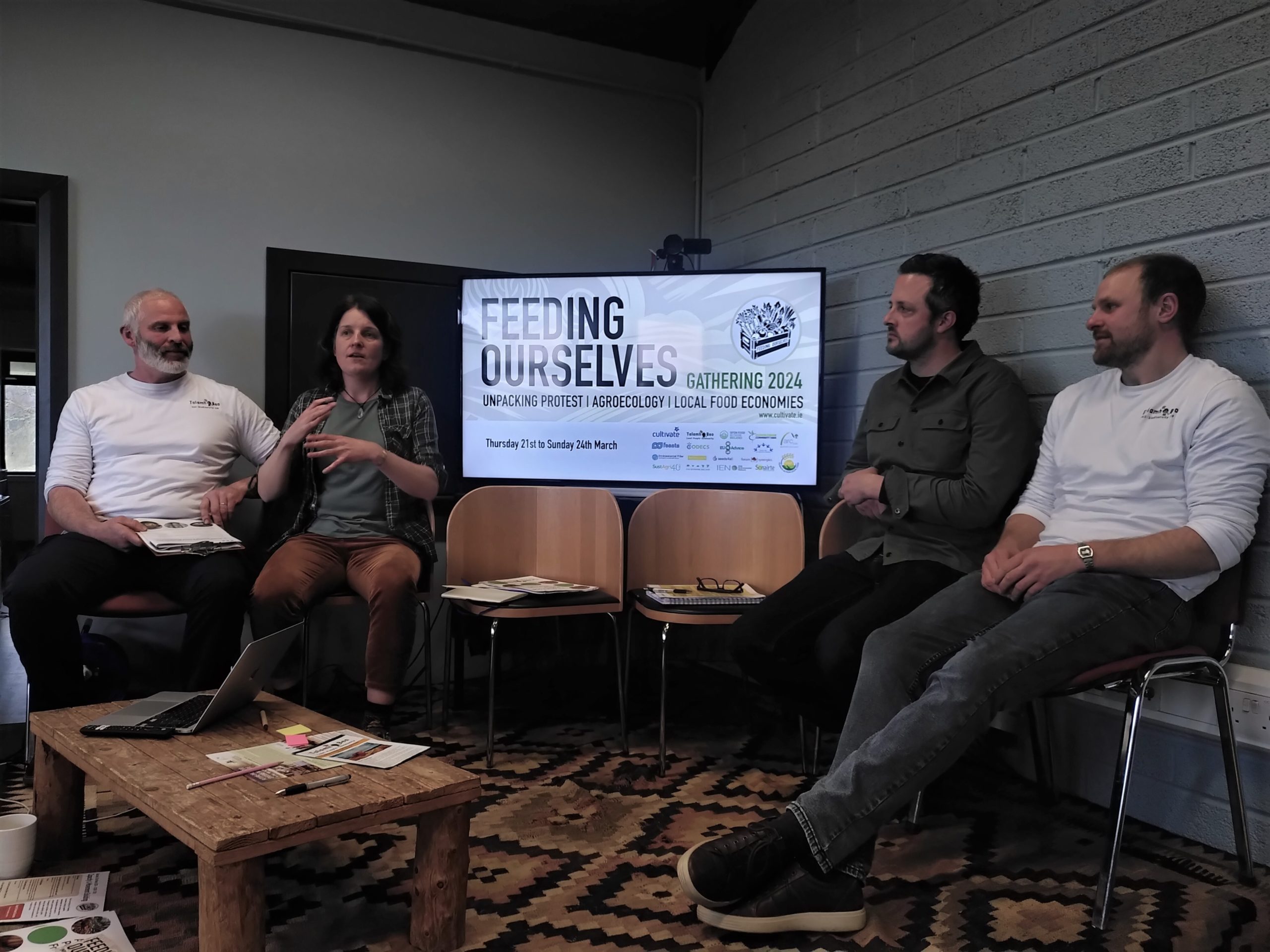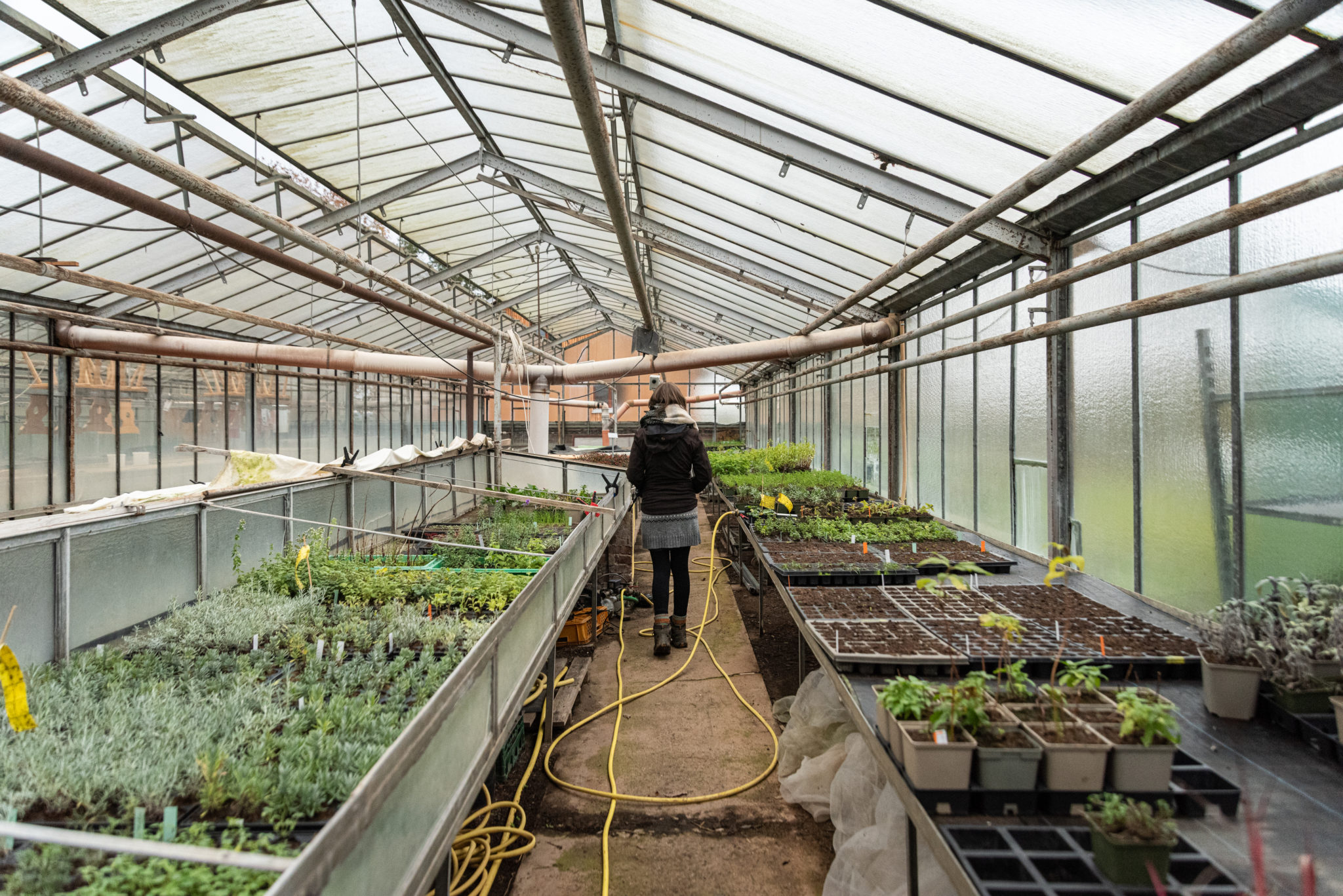Local communities in rural and urban areas can be powerful changemakers when it comes to food system transformation, even when national and EU policies fall way short. At Feeding Ourselves 2024, a roundtable on Bottom-Up Approaches to Sustainable Food Systems brought together actors engaged in the development of fair & ecological food systems in Germany, France and Ireland. ARC2020 was joined by Ann-Marie Weber of kollektiv von MORGEN (DE), Henrik Maas of the Arbeitsgemeinschaft bäuerliche Landwirtschaft (DE), Thierry Lohr, elected representative in the Municipality of Plessé (FR), and Fergal Anderson of Talamh Beo (IE). Alison Brogan presents key lessons of the discussion that unfolded. Additional reporting by Louise Kelleher.
Brussels is currently not the most hopeful place for those wishing to see EU food systems in a fair, ecological transition.
But hope is on the ground. Not waiting for the impetus to come from above, many communities, food policy councils, solidarity farming initiatives, food cooperatives, as well as rural and urban municipalities have already established their own democratic, economic and social frameworks in order to create sustainable food systems.
At Feeding Ourselves 2024, a roundtable on Bottom-Up Approaches to Sustainable Food Systems was a chance to connect partners of two ARC2020 projects, Rural Resilience in France and Rural Europe Takes Action – Germany* with kindred spirits in Ireland. The purpose? To exchange knowledge and experience in the development of fair & ecological local food systems in these different contexts, including on unique components, processes, successes and challenges.
Facilitating participation
Ann-Marie Weber of kollektiv von MORGEN, Marburg-based partner in the project Rural Europe Takes Action – Germany, gave an insight into the work of the collective in creating a culture of sustainability in the city and surrounding district.
Facilitating participatory processes and creative education that anchor climate and sustainability at the local level is core to the work of kollektiv von MORGEN.
The collective plays an important role in accompanying and supporting the development of the region’s sustainable food system, linking stakeholders including politicians, civil society, researchers and producers, and creating neutral spaces for exchange.
Another key point that emerged from Weber’s insight was about the political makeup of local governments, and how this, of course, influences the policy direction, and plays a significant role in helping or hindering moves towards sustainable food systems.

Ann-Marie Weber contributing virtually to the roundtable on Bottom-up Approaches to Sustainable Food Systems at Feeding Ourselves 2024. Photo: Adèle Violette
One local government at the vanguard of championing local food and agricultural policy through citizen engagement is the municipality of Plessé, France, which has been a partner of ARC’s Rural Resilience project since 2021.
Thierry Lohr, an elected representative of Plessé, joined the roundtable to share insights into the municipality’s singular approach to participatory politics and representative democracy.
The citizens’ collective Thierry is part of successfully ran in the 2020 local elections having developed its political campaign through a participatory process, asking residents: “If you were elected yourself, what would you do?”
As such, when the collective won the 2020 election, it had a strong political mandate, including a focus on Farming, Food, Environment and Biodiversity which could then be developed in depth in the municipality’s committee system. All citizens of Plessé over the age of 14 are invited to join the committees, along with elected representatives.
In late 2020 the municipality formed a committee of residents to support the local food and agricultural policy (PAAC). Twelve elected representatives sit on this Committee for Farming, Food, Environment & Biodiversity, along with 26 committed citizens or VIPs (Volontaires Investis à Plessé).
The committee includes but is not dominated by farmers, reflecting the need for an integrated approach to rescuing the local farming sector. It is the residents who are proactive in the PAAC, with the municipality playing the role of facilitator.
Hearing about this ambitious approach to governance and democracy, participants in the room in rural Tipperary shared doubts about the potential of local government in Ireland to play such a role in sustainable food systems.
Ireland being a very centralised country, local self-government is in a restricted position. A 2023 report found that “in many respects the position of local government is weaker in Ireland than in most other European countries … Irish local government turns out as being among those with the lowest scores, with a rank only just above Hungary”.
So, while Ann-Marie Weber noted the importance of having a political anchor at community level to drive transformation of regional food systems, this may not always be found in local government in the Irish context. However, as one participant suggested, anchor institutions can be thought of creatively.
Local anchor institutions need not necessarily be public bodies – theatres and sports clubs, for example, can leverage procurement to support sustainable local food economies.
Progressive procurement is a tried and tested way to approach community wealth building. And while public procurement processes must abide by relevant laws, there is still scope to shape them so that local authorities, hospitals, schools, prisons etc can provide staff and the public with healthy, locally and ecologically produced food, while generating demand for such produce and supporting producers in so doing. In Ireland, a new green public procurement rule means that 10% of the value of food procured must be organic. The minimum green criteria could in future be expanded.
Moreover, community food hubs could be trusted intermediaries to aggregate sustainable local food production for procurement needs. Digital tools like the Open Food Network could support this.
Local Land Access
Access to land is another area where the local level can be a powerful point of intervention. In Ireland, land consolidation is a growing issue that needs to be addressed sooner rather than later, and land transfers are particularly pertinent given the ageing farming population.
This topic came up many times throughout Feeding Ourselves 2024, including during the closing plenary in the contribution of Simone Matouch (Forum Synergies) on intergenerational cooperation and sustainable food systems. She proffered that the handover to younger generations will encounter challenges, but these challenges can make space for innovation to flourish, for outside-the-box thinking to take root. In these processes of generational renewal, Matouch emphasised the importance of not casting aside the older generation: they have the experience, and the youth have the energy.
Generational renewal is interconnected with land access. Who inherits the land when a farmer retires? If the farmer’s family does not take over, is there an aspiring farmer in the community who would jump at the opportunity? Otherwise, might the land be hoovered up by an expanding neighbouring farm?
Other EU countries have more experience with promoting land access and dealing with consolidation than Ireland does. Simone Matouch pointed to examples in France including Plessé – where they have managed to maintain the number of farms in the region since 2020, replacing 26 retirees with 26 new entrants – and to Terre de Liens. These are just two of the many approaches working to secure land for peasant, agroecological farming and living. There was discussion in the room about the need to establish an initiative such as a land observatory in Ireland.
As well as ownership, leasing needs to be improved. Henrik Maas highlighted the common good leasing initiative put forward by the German small farmers’ organisation AbL (the Arbeitsgemeinschaft bäuerliche Landwirtschaft). A decision-making guide for municipalities and private landowners on who should get to lease the land, it broadens the lens beyond market considerations: criteria include climate protection, nature conservation, labour rights, maintenance and development of peasant farms.
Connecting the levels – Short Food Supply Chains
Neither civil society, local communities, regional, national governments nor the EU alone can find solutions to the major challenges and crises food systems face. Coherence and collaboration is needed between the multiple governance levels and disciplines intersecting in food systems.
The Rural Action Gathering for Sustainable Food Systems co-organised by kollektiv von MORGEN at the local level in Marburg, the Arbeitsgemeinschaft bäuerliche Landwirtschaft (AbL) at the regional and national levels and ARC2020 at EU level last November is just one example of how a broad range of food system actors can come together across disciplines and governance levels to collaborate for future-proof food systems.
The Marburg Action Plan for Future-Proof Food Systems in Europe, which resulted from the gathering, presents a snapshot of the transition in motion, setting 6 goals and delineating actions to be taken by political, private and civil society actors from the local to European level for the transformation of how we produce and how we eat.
As Henrik Maas emphasised, this transformation needs to focus on both agriculture and food: “You can’t change agriculture without taking account of what consumers want, and you can’t change consumption without listening to the voices of farmers.”
He also noted that the European farmers’ protests seem to have one demand in common: fair incomes and better prices. While we don’t see much progress on this at EU or national levels, AbL is working in this direction at all levels and promotes short supply chains and exiting of commodity markets as a route to stable and fair incomes, according to Maas.
Joining the dots from local to the national is important
There are more than 60 food policy councils in cities and towns across Germany, and last year a network was created to better represent these food policy councils at national level.
In Ireland, notwithstanding – or perhaps because of – the national agri-food strategy focus on big industry, commodity exports, and a stark lack of support for small-scale producers, there is a growing grassroots movement creating pathways to support local, agroecological food production so small farmers can earn a fair living and communities can access local and ecologically produced food. There is an important opportunity to deliver a national framework for agroecological food system transition.
To this end, Talamh Beo, the Irish chapter of Via Campesina, has recently launched a Local Food Policy Framework with a simple premise: “We want everyone in Ireland to have access to locally produced, nutrient dense, chemical-free food. We also want farmers to earn a fair living from providing that food into their communities.” Noting the many commonalities between these farmer-led proposals for Ireland and work on the ground in Plessé and in Marburg, Fergal Anderson of Talamh Beo emphasised the need for a coordinated effort.

Talamh Beo’s Thomas O’Connor, Janet Power, Fergal Anderson and Brian Meredith introducing the Local Food Policy Framework. Photo: Louise Kelleher
To conclude, there are cultural, political, environmental, place-based and other differences in each locality, and no one-size-fits-all approach. Possibilities and pathways differ, even in neighbouring villages, depending on governance mechanisms, the mix of people, political will, available resources, infrastructure, cultural identities and shared visions of the future. Barriers to access are even higher for those who, for a variety of reasons, struggle to put down roots in a community – generation rent, seasonal migrant workers or asylum seekers.
There are also common causes: the demands for fair farming incomes and for equitable access to fair and ecological food, so often thwarted by EU and national policy blockers.
Local communities in rural and urban areas are leading on the transformation of local and regional food systems, even when policies and politics at national and EU levels fall way short. It is not too late for an integrated EU rural-agri-food framework to overarch the transition.
*The Rural Europe Takes Action – Germany project is supported by the Robert Bosch Stiftung.





